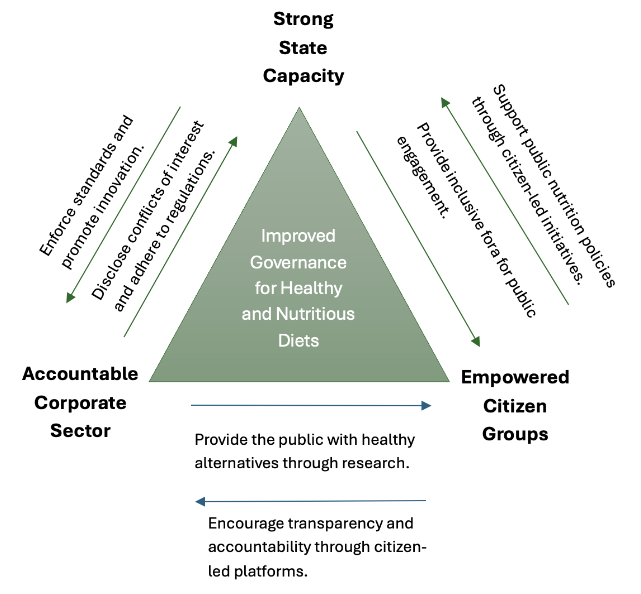In this Article
Expanding access to affordable, nutritious, and diverse diets has become a global priority in response to public health challenges, climate change, conflict, and pressures on food systems. Strengthening institutional capacities and partnerships is essential to achieving this goal.

Chapter 8 of the International Food Policy Research Institute (IFPRI) 2024 Global Food Policy Report (GFPR) highlights the importance of improved governance in diet and nutrition. It focuses on enhancing state capacities, improving corporate accountability, and fostering citizen agency in decisions about healthy foods. These three dimensions are interconnected, ideally creating positive feedback loops that influence all aspects of food system transformation.

State capacity is essential for the effective implementation and sustainability of diet and nutrition policies. It encompasses a government’s ability to develop policies, regulate commercial activities, deliver services, navigate trade-offs, and generate revenue in a transparent and accountable manner. Additionally, it requires aligning nutrition goals with other state priorities to ensure coordinated action. Policy efficacy varies over time, and capacity involves learning and adaptation. Countries such as Chile and other low and middle-income countries (LMICs) have demonstrated that large-scale food fortification programs are most effective when supported by sustainability planning including continuous quality assurance and control, monitoring of industrial processors, and adaptive measures as consumption patterns change over time.
The private sector is a critical partner in advancing diet and nutrition goals, though its influence can be beneficial and problematic. While some multinational food companies have used corporate spending and biased research to sway policies, other businesses positively contribute by addressing malnutrition and promoting healthy diets. Meanwhile, citizen agencies can improve food security by allowing individuals to participate in decision-making structures. This has led to initiatives like food policy roundtables and multi-stakeholder platforms that unite civil society, government, and business representatives.
Effective governance across all sectors and government levels is crucial for the adoption and implementation of policies. Key recommendations from the GFPR include: (1) integrating governance assessments with health and economic evaluations to ensure sustainable, scalable diet policies; (2) identifying and addressing governance barriers; (3) promoting information access to increase accountability, using transparency scorecards, and monitoring commitments to nutrition goals; and (4) supporting the expansion of civic spaces to enable grassroots input on policy needs for healthy food systems.
Reference: Resnick, D. and Chugh, A. (11, October 2024). Global Food Policy Report 2024: Improving governance to create supportive environments for diet and nutrition policies. International Food Policy Research Institute. Retrieved November 3, 2024 from https://www.ifpri.org/blog/global-food-policy-report-2024-improving-governance-to-create-supportive-environments-for-diet-and-nutrition-policies/




